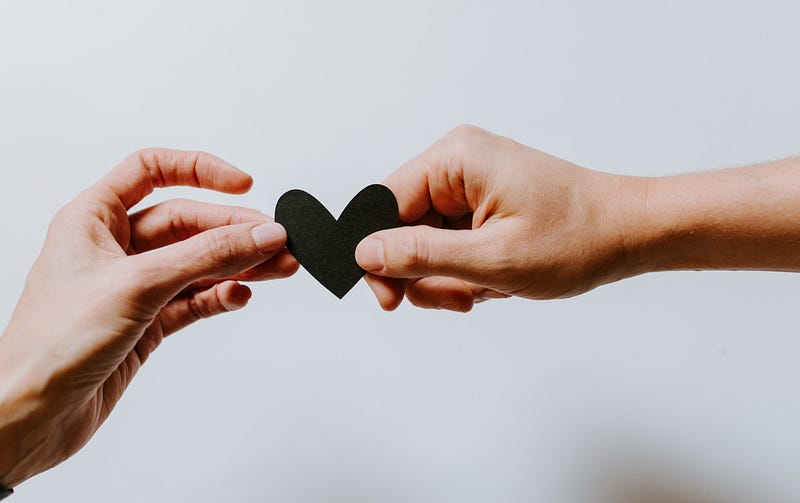3 Ways to Better Understand What You Want in Relationships
Is it happiness? Why do you spend time with the people that you do?

Throughout our lives, we are all going to have hundreds of thousands of relationships.
Some short term, some long term.
Some in-person, some online.
Some loving, some not.
Some fruitful, some toxic.
But there’s a commonality throughout all of the relationships that you’re going to have in your life — that’s you!
What do you want out of your relationships?
That might seem like a selfish question to answer but it really isn’t. If you don’t identify and understand what you want out of relationships, then you are likely to be mentally and emotionally drained fairly easily. If, for example, it’s most important to have physical touch between people you’re close too but your friend refuses to hug or high five or shake your hand, that might leave you empty after a certain period of time.
"Don't listen to 99% of people." Some of my recent tweets have been very controversial. I've read a number of responses…harrisonwendland.com
What you want is likely not exactly what the other person wants also so there must be some sort of compromise. We’re going to walk through three different potential hypotheticals so we can better understand what our needs are is individuals.
Let’s begin.
1. What do you feel inclined to do with certain people that you would never do with others?
Think about that for a moment. It’s crazy isn’t it?
How there are people around us who seemingly “force” us (though we always must decide for ourselves) to do things we wouldn’t regularly do.
Maybe that is something like indulging in an excess of alcohol beyond your regular norm.
Maybe that is something like increasing vulgarity within your word choice.
Maybe that is something like reading more books and learning.
Maybe that is something like eating vegetables and fruits around that person.
This goes two ways, quite clearly.
“Took you up under my wing and you just stayed there. You was supposed to grow some wings, get your own pair.” — Drake
So, now take a mental inventory. Think about those that you spend time with. What do you with certain people that you don’t regularly do otherwise. Are those positive or negative things for you?
“There are either good influences or bad, it’s black and white there is no gray.” — Grant Cardone
Some people may find an increase in alcohol consumption is positive for them as it increases their sociability and gets them into cultural environments they wouldn’t be in otherwise.
Others may find that increase as a negative thing due to their decrease of control over oneself and poor feelings the next morning.
That’s up to you.
Congratulations Harrison!! Wait... for what? Did I do something? If you congratulate someone by saying…harrisonwendland.com
But what’s most important with this first area is understanding and being AWARE of what you do uniquely with certain people or a certain person. Is that thing good or bad?
THEN, do you need more OR less of those people in your life?
AND, do you need more OR less time with those people?
There’s something that you can do called a personal inventory. This is literally an inventory of all the people that you spend time with.
Maybe you spend 90 minutes a week talking to your brother. That’s about 1% of your weekly available time. Is that good? Are they positive or negative for you?
It’s important not to think beyond this question and answer it intuitively and objectively. There are always other factors but we aren’t addressing them right now.
How much time is too much time with someone?
Maybe your brother is a very negative individual and after 30 minutes of talking to them on the phone you find yourself participating in that negative outlook.

Does that mean you shouldn’t talk to them for more than 30 minutes at a time? IF they’re negatively influencing you after that 30 minutes then absolutely, yes. Stop that. This doesn’t mean you need to love them any less than you do, it just means that you can NOT sabotage your own potential because you think it values them.
So let’s look at this one other way before we move onto the second point.
What’s better?
— to give 60% of yourself for 3 hours
— to give 100% of yourself for 1 hour
That’s up to you. But for me, I’m choosing the 100% every single time. I don’t want to go halfway and I certainly don’t want to give less than 100% of myself to anyone else — THAT is selfish.
What is your best? What is your 100%?I recently finished reading Henry Ford's autobiography and enjoyed learning more…harrisonwendland.com
Being responsible and in control of the time and energy that you dedicate to relationships is NOT.
There are people in my life I could talk to every single day and others I really don’t want to see more than once or twice a month. That’s just being honest. If I dedicate more than a once or twice a month encounter with certain people I know that I won’t be able to give 100%. So I prefer to lessen the frequency rather than lessen the impact and level of presence I provide to that group of people.
It’s just something we will need to determine and commit to for ourselves. We only have 168 hours each week and most of us need to work and sleep in there also. That’s typically at least 50% of the week.
So to whom are you going to dedicate the remaining hours? I hope that a great portion of that goes to self-care through things like prayer, reading, exercise, and maintain a high-quality diet.
But it’s all up to you — it always is.
If there are certain people that lead you to do things that are uncharacteristic with your present self… decide if you want those traits to become characteristic of your future self.
Decide. Commit. Make a change.
2. Do you expect the other person to treat you how they want to be treated?
I’ll go first… I certainly don’t.
I expect the people who are truly close to me to treat me how I want to be treated.
If I were to treat people how I want to be treated… most people wouldn’t like that so much. In the gym, I like to hear about the doubters. I want you in my ear naming people who say I can’t do it. I want you in my ear stating people BY NAME who say I can’t, or I’m weak, or I’m never going to make it, or I’m fronting, or whatever it might be. I want to hear it so I can look in the mirror and look in my eyes and see how I’m working.
That might make other people cry. It’s not a “delightful” thing to hear that so many of the people closest to you do not believe in you. For me that’s motivating, but I have enough awareness that behavior like that is unappreciated when it’s uninvited. Nobody wants me to walk up to them and say, “hey your cousin said you’re lazy and will never amount to anything.”
That’s not a positive thought to have — but it could be great fuel if you know how to shift it and pivot. Regardless of if you’re able to learn and develop that skill or not… some people simply don’t like it and don’t want it — that’s ok.
Just realize, the way that you want to be treated is NOT how others want to be treated.

Some people love to be all touchy feely and great people with hugs, laugh with people with hugs, say thank you with hugs, eat dinner with hugs, drive the car with hugs, go to the zoo with hugs, eat ice cream with hugs and say goodbye with hugs. Others don’t always like that, sorry!
I’m good and totally content with a hug when we say goodbye. One great hug is enough for me!
But, again, we must realize that refusing a multitude of hugs from our valued relationship may leave them feeling neglected AND disconnected from us. That’s not a desired outcome unless you’re trying to cut them out of your life (and in that case please be more direct and honest).
Back to center. Do you expect the other person to treat you how they want to be treated?
By this point, I hope that answer is no.
The reality is that you should know in all of your highly valued relationships how the other individual likes to be treated. Then, can you fulfill that? How well? What are you lacking? Be transparent about that.
Saying something like, “I know how much you value frequent hugs but that’s out of my comfort zone. I want to develop that more as I recognize how important it is to you in a relationship. Please be patient with me as I continue to expand and grow.”
It’s hard to react to that negatively. What can someone really say to that?
They could say, “Oh, you shouldn’t have to work on that, just have it today! I need hugs right now!”
Then quite honestly, maybe you’re better off without that person if they expect you to change your entire being on a whim just because they decide to feel uncomfortable as a result.
“People left when the house was falling apart, not knowing I was tearing it down to build a mansion, I just wanted to see who was gonna grab a hammer.” — Leonard Fournette
We need to think about the rules we place in relationships.
Is your mother expected to console you after a heartbreak?
Is your boss expected to extend grace when you miss deadlines due to stress?
Is your significant other expected to make dinner when you’re working late?
If we treat others how we want to be treated, there is going to be a grand disconnect. As a result, we need to think about the individual themselves. And… ASK. Ask OFTEN.
“Hey, do you like it when I hug you during greetings and goodbyes? I can look to hug you more often if you’d like.”
“So, do you enjoy it when I cook for you? I’m a baker too and can make some desserts for you if that is something you’d appreciate, it’s very rewarding.”
“I think it upset you when I changed the plans without notice, did I understand that correctly? In the future I’ll be more proactive, will that be better for you?”
We need to be transparent and honest… at least if we are striving to develop meaningful relationships. Think about the things that you are doing that other people like and then the things that you are doing that other people don’t like.
The actions that others don’t like, is that because of you or because of them?
Do they like what you’re doing but you just aren’t doing it well? That’s important to figure out.
We need to understand what others are expecting out of us so that we know if we can fulfill those expectations and then exceed them — or not.
3. What value do you provide in relationships?
This one might seem a little bit contrary to the first two but this is by far the most important. BY FAR. Without question the most important.
You need to know what you bring to the table.
If you’re around a bunch of people who love things like golf or poker but you’re a comic and provide that on all occasions, that may not be so appreciated by those people.
Maybe you’re the type of person who always lights up the room and you spend a lot of time at the halfway houses people are rebuilding their lives at, your presence is likely very appreciated.
You WANT to use your gifts and abilities, don’t you? I know that I do.
As shared previously in the second item here, we need to understand what others are expecting out of us so that we know if we can fulfill those expectations and then exceed them — or not.
Maybe you are the person that I spoke about earlier who enjoys and appreciates hugging people all the time. If you are surrounded by relationships with people who do not appreciate or value hugging then you obviously are not using some of your talents and gifts (yes providing a warm embrace through hugs is absolutely a gift).
The vital part of this third aspect is the correct identification of your value.
Is it perspective? Wisdom? Generosity? Warm embrace? Compassion? Work ethic?
What is your value in relationships? It could be different but there is likely going to be some level of commonality.
I’ve found more and more that one of my greatest value adds is accountability and encouragement. It’s asking people, “Did you go to the YMCA this morning like you planned to?” Then after that, it’s providing some perspective and either a slap on the wrist or a pat on the back. That’s what I’m good at.

I call it how it is. Do you want me to butter it up? Sure, but I’d rather give it to you straight. Something like, “You didn’t do what you said you would and I expected more from you, let’s improve next time. Let me know if I can provide insight or you can take care of it yourself.”
That’s a difficult thing for many people but a natural thing for me. I give myself those types of messages every single day in the mirror. I look at myself and assess the previous day. Did I follow through? Did I fall short? Did I execute?
What’s your value? What are you great at? What do you find yourself doing often for others that is rewarding to you?
“Listening says, ‘I value your opinion, I care about our relationship, and you matter to me.’” — Rick Warren
IN CLOSING
1. What do you feel inclined to do with certain people that you would never do with others?
2. Do you expect the other person to treat you how they want to be treated?
3. What value do you provide in relationships?
“The more you celebrate others, the stronger your friendship and bond will become.” — Julie Mullens
Join my weekly newsletter to see all of my writing here.
